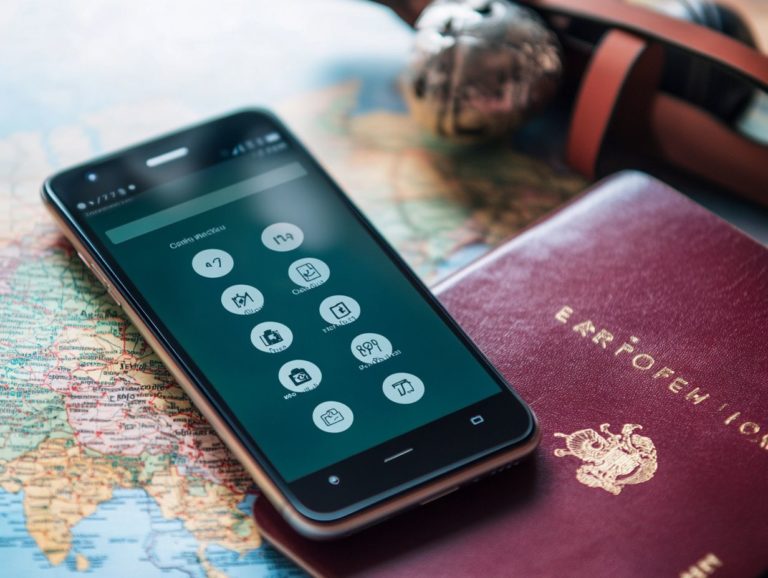Navigating Visa Requirements for Student Travel
Get ready to explore the world of student travel! It can be thrilling yet challenging, especially when it comes to understanding the intricacies of visa requirements.
Whether you re preparing to study abroad, enroll in a short course, or seek work experience, knowing the correct type of visa is essential. This article clearly explains the basics, starting with a definition of what a visa is and the various types tailored for students.
You’ll find practical tips to streamline your application process, ensuring your journey gets off to a flawless start.
Immerse yourself in this guide to equip yourself with everything you need for a seamless student travel experience!
Contents
- Key Takeaways:
- Understanding Visa Requirements for Student Travel
- Types of Visas for Student Travel
- Student Visas
- Tourist Visas
- Work Visas
- Factors to Consider When Applying for a Student Visa
- Step-by-Step Guide to Obtaining a Student Visa
- Tips for a Successful Visa Application
- Frequently Asked Questions
- What are visa requirements for students traveling to different countries?
- Do all students need a visa for international travel?
- How early should I start the visa application process?
- What documentation do I need to apply for a student travel visa?
- Can a student travel visa be extended or renewed?
- What happens if my student visa application is denied?
Key Takeaways:
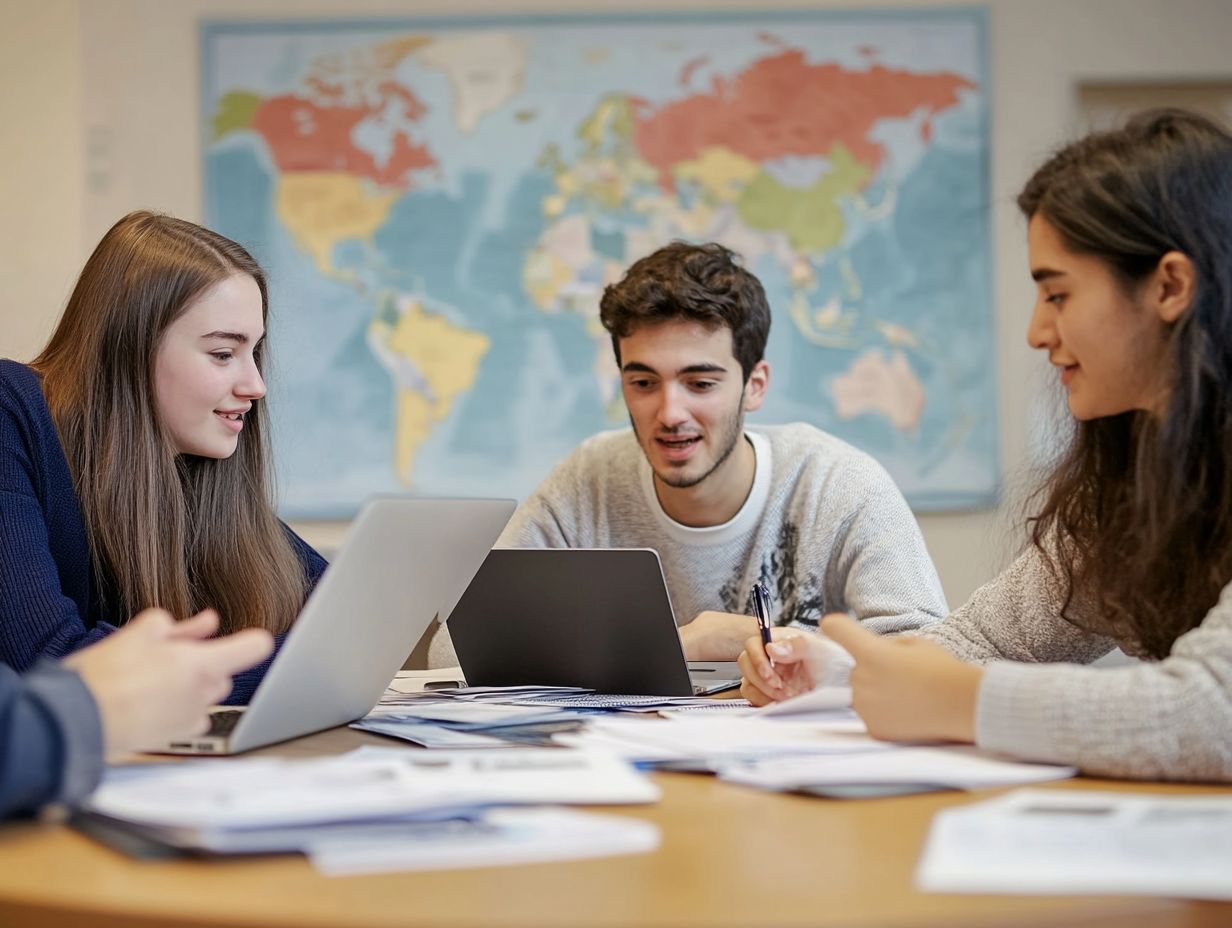
- Understand the purpose and types of visas for student travel.
- Consider factors like duration of stay and financial requirements when applying for a visa.
- Follow a step-by-step guide for the visa application process.
Understanding Visa Requirements for Student Travel
Understanding visa requirements is essential if you’re an international student eager to embark on an educational adventure abroad. Each host country has its own specific visa types and regulations.
Navigating the visa application process can often feel like deciphering a complex puzzle. Whether you’re applying for an F-1 visa, which allows you to study full-time in the U.S., a Tier 4 student visa in the UK, or a study permit in Canada, it’s vital to familiarize yourself with the necessary documentation, compliance regulations, and financial requirements.
This section clarifies the key elements of visa requirements, ensuring that you can transition smoothly into your new academic environment.
What is a Visa?
A visa is an official document granted by a country’s consulate or embassy that permits you to enter, stay, or exit that country for a specific purpose, such as studying abroad. Securing the appropriate visa is essential for legal compliance and a hassle-free travel experience.
This document typically specifies the duration of your authorized stay, work conditions, and compliance regulations, making it vital for you to grasp its implications fully.
Different visa types align with various activities, including study, work, or tourism. For example, a student visa usually allows limited work hours. Engaging in unauthorized employment can have serious consequences, including the revocation of your visa.
Understanding these nuances is crucial. Breaking the rules can harm your future travel and education. You need to be well-informed about application processes, deadlines, and documentation requirements to ensure a smooth transition to studying in a foreign country.
By keeping these details in mind, you can concentrate on your education and enriching experiences without the constant burden of visa-related worries.
Types of Visas for Student Travel
When considering student travel, grasping the different types of visas available is essential for international students aspiring to study in sought-after destinations like the U.S., UK, Canada, or Europe.
The main categories include student visas, like the F-1 visa for full-time students in the U.S., the J-1 visa for exchange visitors, and the M-1 visa for vocational study. There are also tourist visas for short visits and work visas for those seeking employment during their studies.
Each visa type presents its own unique requirements and potential benefits, making it crucial for you to choose wisely.
Student Visas
Explore the world of student visas and unlock new opportunities for your academic journey! Student visas, such as the F-1 visa for academic pursuits, the J-1 visa for exchange programs, and the M-1 visa for vocational studies, are designed to improve your academic journey abroad.
These visas allow you to dive into new cultures while receiving a quality education tailored to your aspirations. To qualify for the F-1 visa, you’ll need to enroll in a full-time academic program at a recognized institution.
The J-1 visa requires you to participate in an approved exchange program, often focusing on cultural or professional exchanges. If you re aiming for vocational training, the M-1 visa is the way to go.
It s essential to remember that each visa application requires proof of acceptance from an educational institution. This documentation is vital; it underscores your intention to study and serves as a key requirement in the application process, ensuring that you are genuinely committed to your educational goals.
Tourist Visas
A tourist visa is primarily designed for individuals visiting a country for leisure. However, it can also be a temporary solution for you if you’re an international student waiting for your student visa approval.
This type of visa grants you the opportunity to explore your host country, immerse yourself in its culture, and even participate in short educational programs or workshops while your primary application is in progress.
The application process typically involves submitting documents like proof of accommodation, evidence of financial stability, and a planned itinerary, all of which can vary depending on the country. Be cautious, though tourist visas often come with limitations, such as restrictions on engaging in full-time studies or working legally.
If you find yourself in a situation where you must wait for your education visa, applying for a tourist visa can provide a temporary reprieve. This will allow you to explore and network, enriching your academic experience in the long run.
Work Visas
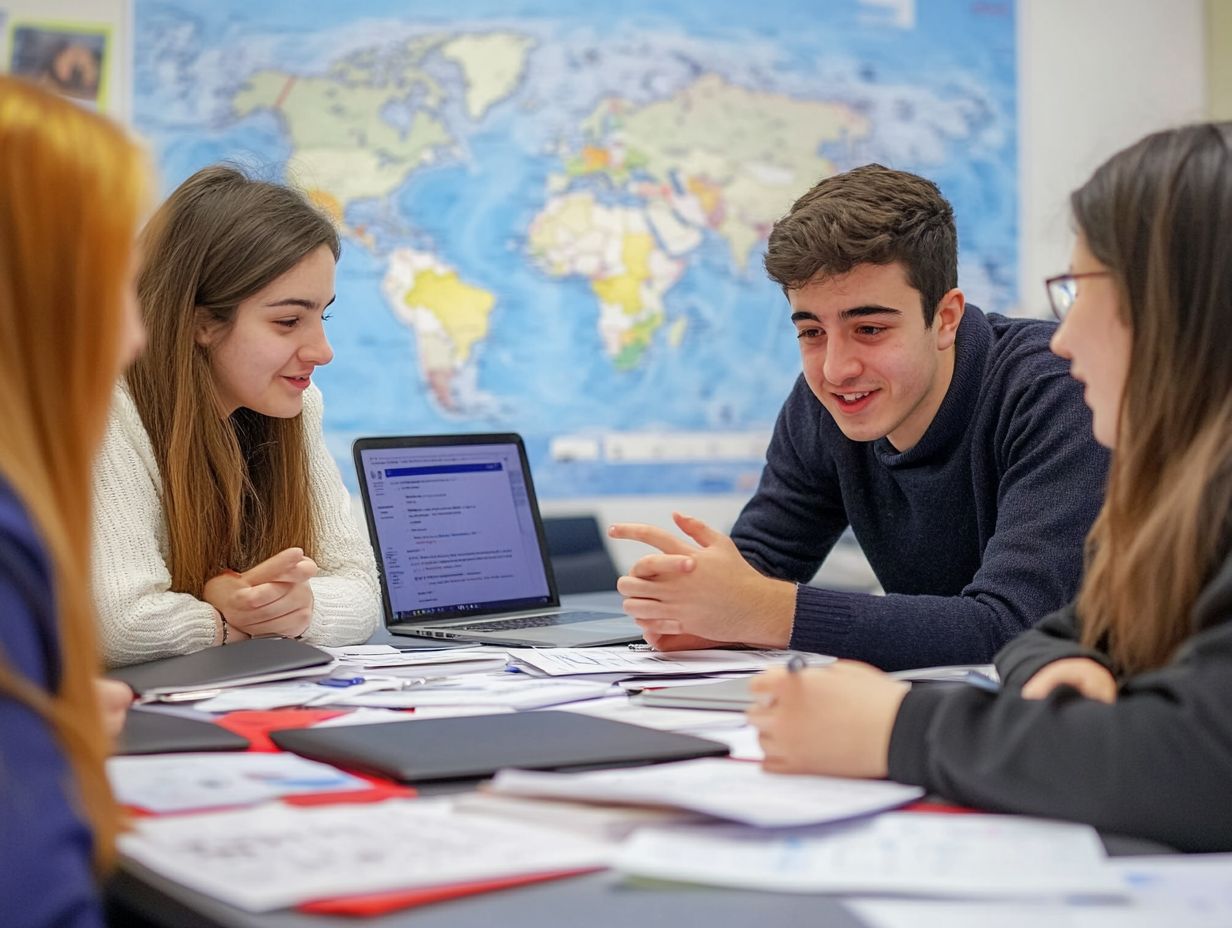
Work visas offer you the opportunity to secure employment while studying, providing not only valuable experience but also a means to help cover your travel expenses. These visas come in various types, each tailored to meet specific needs and circumstances, such as your field of study and the duration of your stay.
Among the most common options are the F-1 Optional Practical Training (OPT) and Curricular Practical Training (CPT), which allow you to work in roles closely related to your degree. It s vital for you to grasp the regulations surrounding these work permits, as they typically specify the number of hours you can work and require that your employment doesn t interfere with your academic commitments.
Navigating the balance between work and study can be a bit of a tightrope walk. Therefore, it is essential for you to plan your schedule wisely.
Factors to Consider When Applying for a Student Visa
When applying for a student visa, consider several critical factors to ensure compliance and secure successful approval. First and foremost, the duration of your stay will dictate the type of student visa you should pursue.
The country you wish to study in may have its own specific regulations that can differ significantly from others. It s crucial to familiarize yourself with these nuances.
Understanding the financial requirements is essential. This includes providing proof of funds and any available financial aid, which will help you navigate the visa application process effectively.
Duration of Stay
The duration of your stay is a critical factor when applying for a student visa. It determines the type of visa you need and the length of authorized stay permitted.
Understanding this aspect is essential as a prospective international student because each visa category has specific requirements and limitations. These can significantly impact your academic journey.
For example, longer programs may require a different visa classification to accommodate the extended duration of your studies. Therefore, proper planning is vital; it enables you to thoughtfully consider your academic timeline and navigate the complexities of the visa application process without interruptions.
By doing this, you can concentrate on your educational pursuits and ensure a smooth transition into your studies. This approach helps you sidestep the anxiety that often accompanies sudden visa-related hurdles.
Country of Destination
The country you choose as your destination is important for your visa application. Each nation has its own unique visa regulations and requirements for international students.
Understanding these nuances is vital; they can greatly influence the complexity, duration, and overall feasibility of securing a student visa. For example, in the U.S., the regulations tend to be quite stringent. You often need to provide proof of financial stability and acceptance into a recognized institution.
In contrast, Canada offers a more streamlined approach, complete with options for post-graduation work permits. This can be particularly appealing if you re looking to gain experience after your studies.
The UK and various European countries have their own distinct rules. These rules balance rigorous requirements with certain flexibilities that can affect your choice of destination as an international learner.
Financial Requirements
Financial requirements play a crucial role when you apply for a student visa. You must demonstrate proof of funds to cover tuition, living expenses, and travel documentation.
This usually involves providing personal bank statements that show sufficient balances over a specified period. This ensures that you can confidently support yourself during your studies.
Proof of acceptance into an accredited educational institution is vital to strengthen your application. Along with your personal resources, various financial aid options are available to assist you.
These options can significantly ease the financial burden, making your dream education more attainable while highlighting your commitment to your academic journey.
Step-by-Step Guide to Obtaining a Student Visa
Securing a student visa requires a methodical approach. This guides you through several stages from researching the necessary visa requirements to scheduling a consular appointment for your visa interview.
This comprehensive guide outlines the essential steps you need to take to navigate the visa application process successfully. You’ll gather the required documents, familiarize yourself with visa fees, and prepare thoroughly for the interview. This ensures you move effortlessly through the intricacies of visa regulations.
Researching Visa Requirements
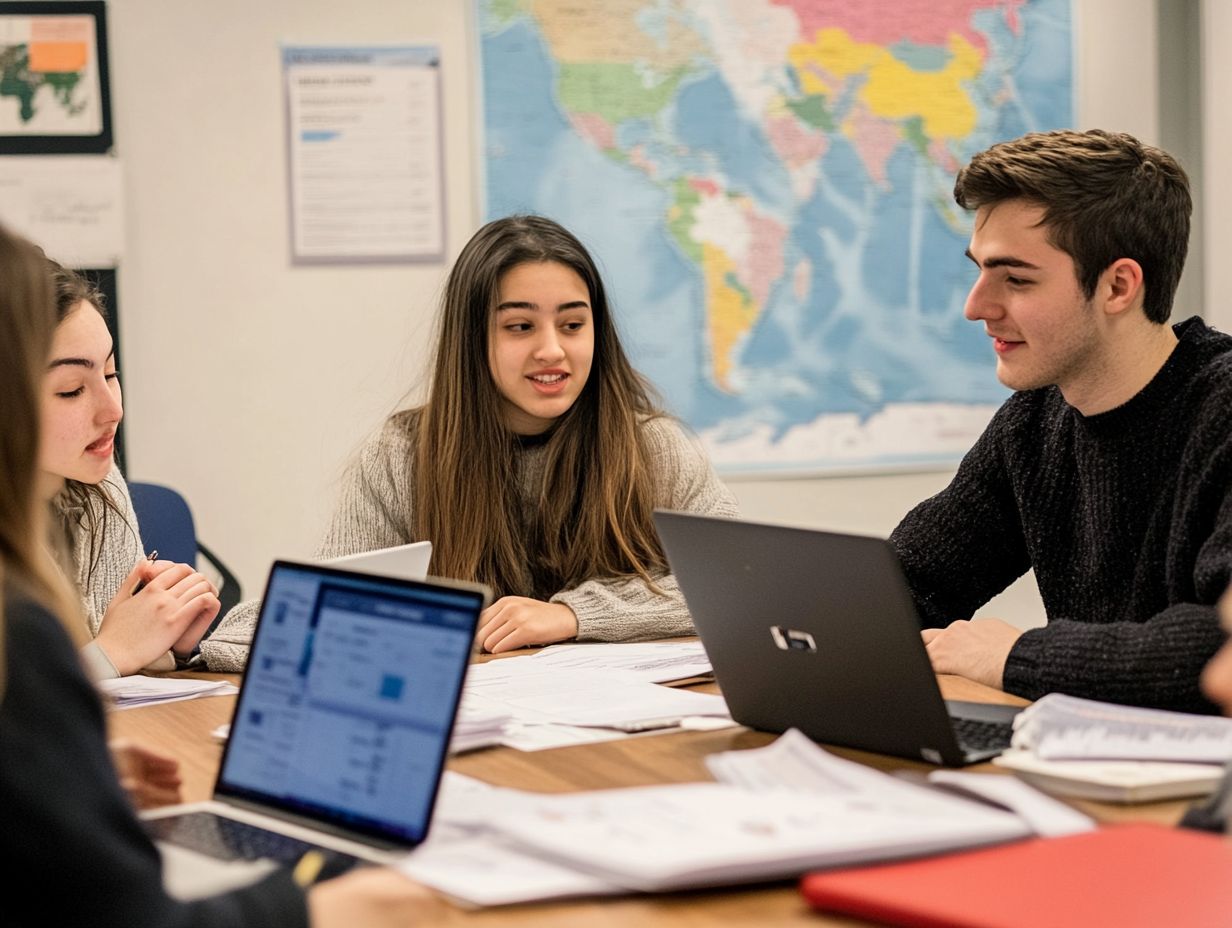
Researching visa requirements is your first step toward successfully obtaining a student visa. Knowing these rules helps make your application process smoother.
This task is crucial because each country has its own unique criteria and procedures that can vary significantly. You might encounter different documentation requirements, financial proof, and deadlines that you need to keep an eye on.
Beyond merely understanding the basic requirements, it s vital to regularly check the official embassy website for the latest updates and changes. Regulations can shift unexpectedly due to political or health-related events.
Being meticulous in this research not only smooths out the application process but also significantly reduces the chances of delays or complications. Prepare well now, and you’ll be ready to start your exciting educational journey without any delays!
Gathering Necessary Documents
Gathering the necessary documents is an important step in your visa application journey. Missing even a single piece of required documentation can lead to processing delays or, worse, denial of your visa application. Take this chance to get organized; it s a game-changer for your application!
You should be ready to assemble a variety of essential documents to support your application, which can feel overwhelming without a structured approach. To make this vital task more manageable, create a comprehensive checklist to streamline the gathering process. This will ensure that all necessary paperwork is submitted on time.
Key items typically required include:
- Proof of acceptance from your educational institution,
- Financial documentation that demonstrates your ability to cover tuition and living expenses,
- Evidence of health insurance coverage each of which showcases your preparedness for studying abroad.
You may also need to present identification documents such as your passport, photographs, and transcripts from previous educational institutions.
By carefully organizing these materials, you can alleviate some of the stress associated with visa applications and significantly enhance your chances of a successful outcome.
Applying for the Visa
Applying for your visa involves an important step: submitting a completed application form along with supporting documents to the consulate general of the host country. This is the start of an exciting journey!
You have two primary methods to navigate this process: online applications or in-person visits. If you choose the online route, be sure to upload all necessary documents and fill out the form electronically, ensuring everything aligns with the consulate’s specifications. If you prefer the personal touch, booking an appointment at the consulate is essential.
No matter which method you select, using an application checklist is crucial. It ensures you don t overlook any important information or documentation. By closely following the guidelines set by the consulate, you enhance your chances of approval and demonstrate your commitment to following procedures correctly.
Tips for a Successful Visa Application
To ensure a successful visa application, focus on several key factors, including thorough interview preparation and a keen awareness of common mistakes that could lead to delays or refusals.
Understanding the expectations of visa interviews and practicing your responses to potential questions can significantly enhance your chances of securing that coveted student visa.
Preparing for the Interview
Preparing for the visa interview is a crucial step in your application journey. This is the chance to present your case to the consular officer with confidence and clarity.
Invest time to research common questions that may come up. Anticipate inquiries and craft thoughtful responses. Practicing those responses, whether in front of a mirror or with a friend, boosts your comfort level for a more authentic delivery.
Organize all required documents such as acceptance letters, financial statements, and identification so you have everything at your fingertips. Confidence and authenticity during the interview not only showcase your commitment but also greatly enhance your chances of success.
Remember, your passion for study and preparation will shine through!
Avoiding Common Mistakes
Avoiding common mistakes during the visa application process can truly be the deciding factor between approval and refusal, especially when it comes to the accuracy and presentation of your documentation.
Many applicants underestimate the importance of providing complete and precise information. This can lead to unnecessary delays or outright rejections. Misinformation in your forms like incorrect personal details or missing signatures can easily raise red flags for processing officers.
Inconsistent details in your documents, such as inconsistent names or dates, may complicate your application even further. To sidestep these pitfalls, it’s crucial to double-check all entries for accuracy before you hit that submit button.
Keeping organized records is invaluable. This approach ensures that every required document is accounted for and formatted correctly, paving the way for a smoother application journey.
Frequently Asked Questions
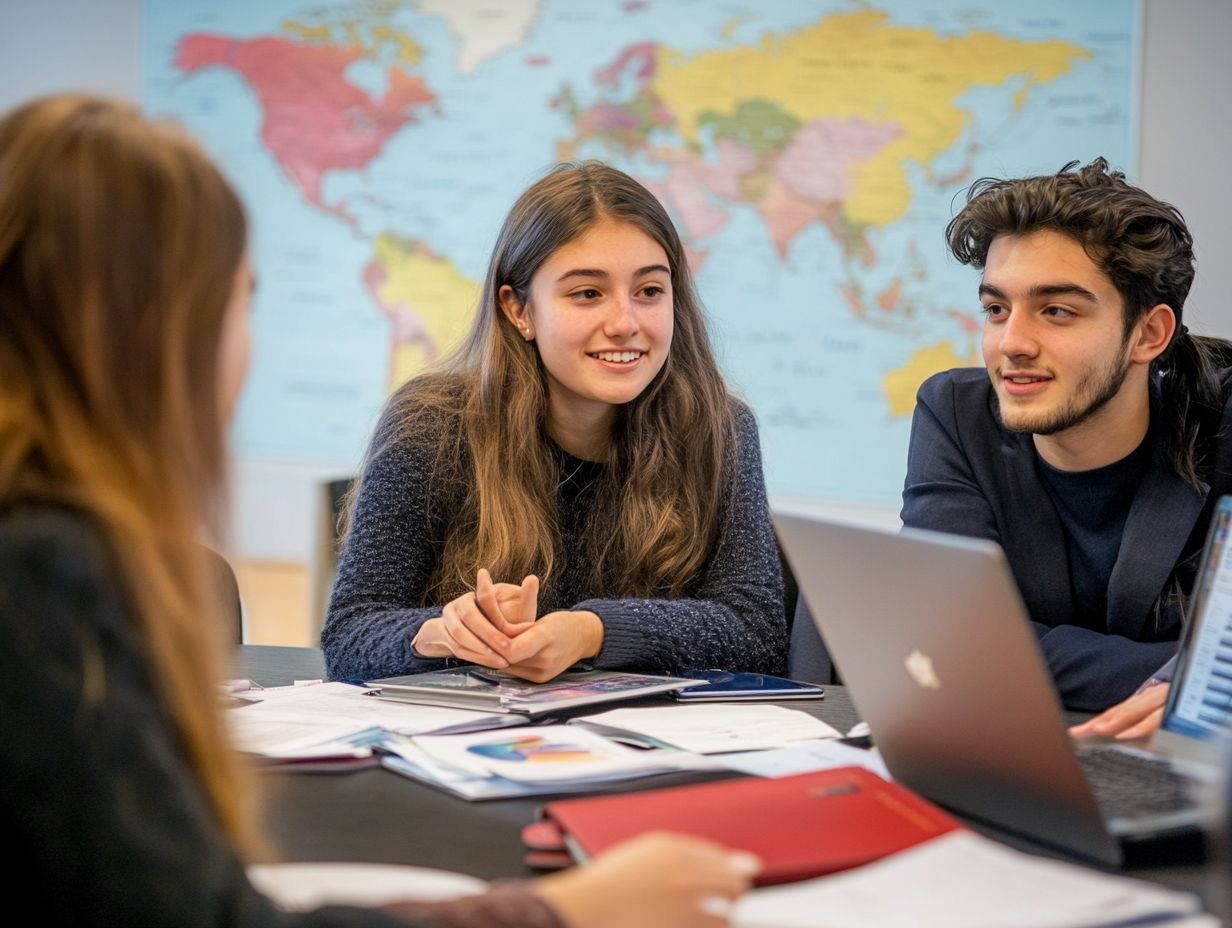
Navigating visa applications can be tricky. Here are some frequently asked questions to help you through the process!
What are visa requirements for students traveling to different countries?
Visa requirements for students vary depending on the country they plan to travel to. It is essential to research and understand the specific visa requirements for the country you are planning to visit.
Do all students need a visa for international travel?
No, not all students need a visa for international travel. Some countries have visa exemptions for certain nationalities or for short-term stays. However, it is always best to check the visa requirements for the country you are traveling to before making any travel arrangements.
How early should I start the visa application process?
It is recommended to start the visa application process at least three months before your intended travel date. This will allow enough time for any potential delays or complications that may arise during the process.
What documentation do I need to apply for a student travel visa?
The required documentation for a student travel visa may vary, but common requirements include a valid passport, proof of enrollment in a recognized educational institution, proof of financial support, and a completed visa application form. Make sure to check the specific requirements for the country you are traveling to.
Can a student travel visa be extended or renewed?
It depends on the country’s immigration policies. Some countries allow for visa extensions or renewals, while others require the student to return to their home country and reapply for a new visa. It is crucial to check the specific regulations for the country you are traveling to.
What happens if my student visa application is denied?
If your student visa application is denied, you will need to reevaluate your travel plans and determine if there are any alternative options available. Some countries may offer an appeal process, while others may not. It is vital to check the specific regulations for the country you are traveling to.





